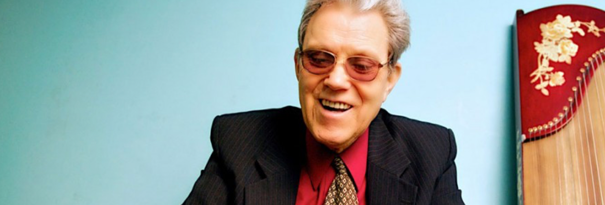
Dr. Lloyd Miller, a musical legend known for his mastery of more than 100 instruments, is quick to hoist his flag in the rock-is-the-devil’s-music camp. Framing his mid-20th Century retreat into Eastern studies around The Beatles, he says, “I told everyone they were horrible. Their tunes were all backwards and stupid. And they were idiots. And they were evil. And everybody hated me for thinking that. So I stopped talking about it and went away and became a hermit.”
And a hermit he remained, throughout most his career. After many successful years playing with jazz veterans like Don Ellis and Eddie Harris in European locales such as Switzerland, Belgium, Sweden, and Germany, Miller moved back to the USA to pursue an education. This journey culminated in his quest for a doctorate in ethnomusicology from the University of Utah.
Winning a grant to study in Tehran, Miller quickly assimilated, even hosting a popular jazz show on Iranian television, in which he went by the name Kurosh Ali Khan. Around that time, Miller gained long-overdue recognition when BBC radio personality Giles Peterson plugged an old copy of Miller’s 1968 meditation in Middle Eastern and Persian sounds, Oriental Jazz. It was a peek through the keyhole into a lifetime of teachings, production work, and progressive, exciting jazz music.
Making up the other half of Miller’s latest collaboration is The Heliocentrics. Following the UK group’s 2009 album with Ethio-jazz legend Mulatu Astatke, it linked up with Miller through its label, Jazzman Records. At first glance, the pairing seems to make sense: The Heliocentrics’ jazz-funk fusion and past collaborative experience with Miller’s free-flowing, virtuosic, Eastern-influenced style. And though the material is solid, the two sides never seem to click.
That’s not to say that The Heliocentrics are bad musicians, or that the record is a total flop. “They learned fast,” Miller says, “but they forgot slowly. In other words, they could pick up stuff and do it. But they couldn’t get rid of years and years of playing funk, punk, hip hop, slop, rock — whatever it was — and come into a new room and close the door. And I don’t know if they ever will.”
Miller expresses disappointment in the collaboration for the self-titled album (released in August on Strut), suggesting that it never moved beyond simple gimmickry. Working with the “cockney garage-band rockers,” however, spawned a number of humorous anecdotes, such as the moment during recording when bassist Jake Ferguson fumbled with a walking bass line for the first time in his life. Miller narrates Ferguson in slacker parody, “‘Oh, man. You scared me with that, man.’” He then asks rhetorically, “That’s the first time? Walking bass is what jazz is all about. That’s all there is.”
Despite Miller’s feeling that he was something of a “cymbal-clapping monkey,” there are plenty of symbiotic, propulsive moments between rock and jazz, as with the opening track “Electricone.” Ferguson helps spearhead the tune with a strong, percussive kick start, leading into the buzz of a clarinet and a minimal wash of woodwinds and piano. Cymbal patterns flutter, as fluently as anything from Miles Davis’ Kind of Blue.
“Salendro” is perhaps the best example of seamless East and West fusion, with its Indonesian pentatonic scaling and agile vibraphone tiptoeing punctuated with a handful of drum kicks. In another well-executed convergence, “Sunda Sunset,” a woodsy sweep is plucked across the strings of the shawm (a Chinese harp), kissed with Miller’s signature clarinet fills like a Himalayan sojourn.
Though Miller’s exasperation and ultimate dissatisfaction threatens to cast a negative pall over the music, the talent of the contributing musicians wins out. Despite what either side thinks, and even though the record doesn’t quite hit all the right notes, Lloyd Miller & The Heliocentrics is a fruitful exercise in eccentric pairing.
Tags: Don Ellis, Lloyd Miller, Miles Davis, The Beatles, The Heliocentrics
